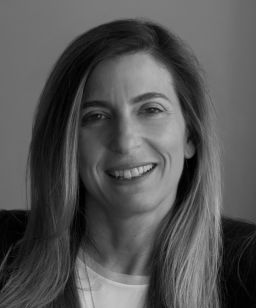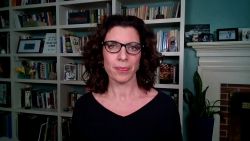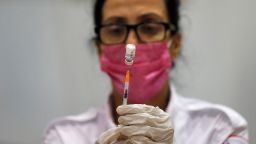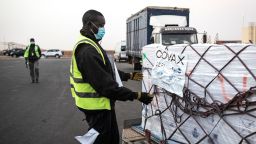Editor’s Note: Meg Jacobs teaches history at Princeton University. Follow her on Twitter @MegJacobs100. The opinions expressed in this commentary are hers. Read more opinion on CNN.
As soon as I got the call last week, I cried.

I was not worried about myself. I was worried about my four kids. Not for caretaking; I have a very competent husband, and the kids are all either old enough to vote or close to it. No, I panicked because my Covid-19 diagnosis triggered the memory of when I got my cancer diagnosis.
I learned that information over the phone, too. A routine mammogram at the age of 49 led to the discovery of a mass and a needle biopsy. For four days, I waited on the results. Finally, just as I was about to leave home to take my father-in-law to a doctor’s appointment, I saw the radiologist’s number pop up on my phone. We had a short, efficient conversation. He gave me the name and number of a breast surgeon and told me not to wait too long.
“So, if someone asks if I have cancer, the answer is yes,” I said. “Correct,” he responded. I hung up, took my in-law to the appointment and waited until I returned home before I called my husband to tell him the news. All along, my single thought was: What will this do to my family?
Over the next few weeks, I was worried about my health. After all of the initial reassurances about catching the mass early and removing it with a successful surgery, clear margins and nothing in the lymph nodes, I got back the results from my genomic testing. Those results basically told me that my tumor, despite all of the promising initial signs, had an elevated risk of recurrence. My first doctor put chemotherapy on the table; several weeks and tests later, my second doctor took it off.
At first, I tried to inject some levity into the difficult road ahead. I would make jokes about the swanky, zippered, leather binder containing the treatment plan I’d received, along with a water bottle, tote and lots of other breast center swag. But the six-week daily routine of going to the hospital, stripping down, climbing on the table and getting zapped with radiation began to wear on me. The horrible burn that comes with the treatment stinks, too – way worse than the sunburn that every kid got in the 1970s. And I’ll forever have the dozen or so tiny tattoos that told the technicians the radiation beams were hitting me in the right place.
Having a cancer diagnosis and receiving treatment was, of course, hard. But what was harder was thinking about what my cancer would mean for my kids. They were younger then. My two little ones were just starting high school, and the next oldest was a junior. My oldest was weeks away from applying to college. My only meltdown – publicly, at least – over confronting the big “C” happened when she and I were college touring and had to fly back home separately because the airline had overbooked the flight from Chicago’s O’Hare back to New York’s LaGuardia. In a vain attempt to persuade the ticket agent to let me travel with my daughter, I yelled, “I have cancer!” (It didn’t work.)
I’m not sure what I thought my diagnosis would do to my kids. Distract them from their schoolwork? Leave them motherless at mealtimes? Or maybe leave them motherless forever?
I certainly know what that kind of loss is like. My father died from a massive heart attack when he was 47, and I was 12. He was playing his weekly Sunday tennis game with my mother when he collapsed. She tried to do CPR, but he was dead before the ambulance arrived. One day he was here, the next he wasn’t. I wrote a note on a piece of yellow legal paper and stuck it in his inside suit pocket as he lay in the coffin. He was leaving, and I wanted him to take something from me with him.
As painful as my heartache was (and is) for my father, I had survived his loss. So, why was I so scared that my kids might not survive if I wasn’t around?
The answer: I was worried I couldn’t protect my kids from fears and heartaches of their own. It turns out they knew a lot, even more than me, thanks to endless streaming of “Jane the Virgin.” When there was a chance I needed chemo, they knew all about the cold cap.
My children are strong and self-possessed – three beautiful, very on-top-of-it girls and one sweet, sweet boy. They’ve been through divorce and remarriage and the blending of two families into one. And yet I didn’t want to scare them or make them worry about more than who they have a crush on or what outfit they should choose for the next day.
I wanted to protect them, not cause them grief. But life just doesn’t work that way. Try as hard as you might, you cannot protect your kids from everything.
Now, I’m three years past my diagnosis and treatment. I go for all my scans and tests. I take my medication. So far, so good. But, in 2020, along came Covid-19.
For almost two years, we’ve all worked to protect our children and keep them safe from this strange, strange illness. My family left New York City on March 16, 2020, right as it became a hot spot for the pandemic. For a few days, we wore bandannas we got from the local Five & Dime in our temporary town, for a few weeks we washed fruit and groceries (I still do). We quickly learned more, we socially distanced, we wore masks, we stayed away for nine months and we did online school.
We all hunkered down together. They were safe. I protected them. We made it work, eventually seeing some friends outside, moving back home and gladly supporting the kids’ return to school. We got our vaccines and our boosters.
And then I got Covid-19 – exactly what my family had feared. My husband and I went to our friends’ apartment for dinner where everyone was triply vaccinated. It was our first or second dinner in years in someone else’s home, drinking wine, talking politics, lingering. We all felt so good to be back together.
Five days later, just after I left the hospital for a biannual breast exam, I got the news those friends had tested positive. My heart sank. Four days later, I tested positive, too.
When I got the call with my Covid-19 results, it felt like getting diagnosed with cancer all over again. I knew it wasn’t the same, of course. But I feared that getting sick would cause my family grief.
We are so lucky that my Covid-19 symptoms were not severe – I felt like I had a mild cold, a few sniffles, a cough or two. The worst part was being separated from my family. I was so looking forward to my older two girls coming home from college over the holiday break. But, instead, we are apart. My husband, who somehow escaped the dinner party pathogens, took all four kids and left the city – again. They made a new family group chat, and I wasn’t in it. My “Covid-cation” is the first time I’ve been alone in two years. Since the pandemic started, we have had constant togetherness.
When the world is falling apart, all you want to do is protect your kids. Because that’s what parents do. They don’t let the danger through the front door – if they can help it.
Now it looks like the worst and the best is upon us. It seems pretty likely that my kids will contract Covid-19, if not from me, then from someone else, but unlikely that it will be severe. And they are seeing that I’m OK. Thanks to science, we really can cure illness.
So, maybe, in some convoluted, exhausting, frustrating, terrifying and horrible way, the lesson is: we will survive. We cannot protect our kids from everything. That is always true, and we’ve all had a master class on that in the last two Covid-filled years. But maybe we – I – need to realize that that is OK.
I’ve survived the big “C” twice. Cancer and Covid-19. And my kids are OK.





















